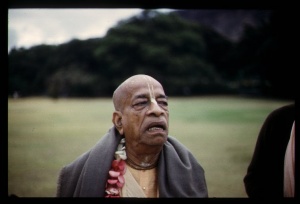SB 10.5.19: Difference between revisions
m (1 revision(s)) |
(Vanibot #0054 edit - transform synonyms into clickable links, which search similar occurrences) |
||
| (One intermediate revision by one other user not shown) | |||
| Line 1: | Line 1: | ||
{{info | {{info | ||
|speaker= | |speaker=Śukadeva Gosvāmī | ||
|listener=King | |listener=King Parīkṣit | ||
}} | }} | ||
[[Category:Srimad-Bhagavatam - Canto 10 Chapter 05]] | |||
[[Category:Bhagavatam Verses Spoken by Sukadeva Gosvami - Vanisource|100519]] | |||
<div style="float:left">'''[[Srimad-Bhagavatam]] - [[SB 10|Tenth Canto]] - [[SB 10.5: The Meeting of Nanda Maharaja and Vasudeva|Chapter 5: The Meeting of Nanda Mahārāja and Vasudeva]]'''</div> | |||
<div style="float:right">[[File:Go-previous.png|link=SB 10.5.18]] '''[[SB 10.5.18]] - [[SB 10.5.20]]''' [[File:Go-next.png|link=SB 10.5.20]]</div> | |||
{{RandomImage}} | |||
==== TEXT 19 ==== | ==== TEXT 19 ==== | ||
<div | <div class="verse"> | ||
gopān gokula-rakṣāyāṁ | :gopān gokula-rakṣāyāṁ | ||
nirūpya mathurāṁ gataḥ | :nirūpya mathurāṁ gataḥ | ||
nandaḥ kaṁsasya vārṣikyaṁ | :nandaḥ kaṁsasya vārṣikyaṁ | ||
karaṁ dātuṁ kurūdvaha | :karaṁ dātuṁ kurūdvaha | ||
</div> | </div> | ||
| Line 17: | Line 22: | ||
==== SYNONYMS ==== | ==== SYNONYMS ==== | ||
<div | <div class="synonyms"> | ||
''[//vanipedia.org/wiki/Special:VaniSearch?s=gopān&tab=syno_o&ds=1 gopān]'' — the cowherd men; ''[//vanipedia.org/wiki/Special:VaniSearch?s=gokula&tab=syno_o&ds=1 gokula]-[//vanipedia.org/wiki/Special:VaniSearch?s=rakṣāyām&tab=syno_o&ds=1 rakṣāyām]'' — in giving protection to the state of Gokula; ''[//vanipedia.org/wiki/Special:VaniSearch?s=nirūpya&tab=syno_o&ds=1 nirūpya]'' — after appointing; ''[//vanipedia.org/wiki/Special:VaniSearch?s=mathurām&tab=syno_o&ds=1 mathurām]'' — to Mathurā; ''[//vanipedia.org/wiki/Special:VaniSearch?s=gataḥ&tab=syno_o&ds=1 gataḥ]'' — went; ''[//vanipedia.org/wiki/Special:VaniSearch?s=nandaḥ&tab=syno_o&ds=1 nandaḥ]'' — Nanda Mahārāja; ''[//vanipedia.org/wiki/Special:VaniSearch?s=kaṁsasya&tab=syno_o&ds=1 kaṁsasya]'' — of Kaṁsa; ''[//vanipedia.org/wiki/Special:VaniSearch?s=vārṣikyam&tab=syno_o&ds=1 vārṣikyam]'' — yearly taxes; ''[//vanipedia.org/wiki/Special:VaniSearch?s=karam&tab=syno_o&ds=1 karam]'' — the share of profit; ''[//vanipedia.org/wiki/Special:VaniSearch?s=dātum&tab=syno_o&ds=1 dātum]'' — to pay; ''[//vanipedia.org/wiki/Special:VaniSearch?s=kuru&tab=syno_o&ds=1 kuru]-[//vanipedia.org/wiki/Special:VaniSearch?s=udvaha&tab=syno_o&ds=1 udvaha]'' — O Mahārāja Parīkṣit, best protector of the Kuru dynasty. | |||
</div> | </div> | ||
| Line 24: | Line 29: | ||
==== TRANSLATION ==== | ==== TRANSLATION ==== | ||
<div | <div class="translation"> | ||
Śukadeva Gosvāmī continued: Thereafter, my dear King Parīkṣit, O best protector of the Kuru dynasty, Nanda Mahārāja appointed the local cowherd men to protect Gokula and then went to Mathurā to pay the yearly taxes to King Kaṁsa. | Śukadeva Gosvāmī continued: Thereafter, my dear King Parīkṣit, O best protector of the Kuru dynasty, Nanda Mahārāja appointed the local cowherd men to protect Gokula and then went to Mathurā to pay the yearly taxes to King Kaṁsa. | ||
</div> | </div> | ||
| Line 31: | Line 36: | ||
==== PURPORT ==== | ==== PURPORT ==== | ||
<div | <div class="purport"> | ||
Because the killing of babies was going on and had already become known, Nanda Mahārāja was very much afraid for his newborn child. Thus he appointed the local cowherd men to protect his home and child. He wanted to go immediately to Mathurā to pay the taxes due and also to offer some presentation for the sake of his newborn son. For the protection of the child, he had worshiped various demigods and forefathers and given charity to everyone's satisfaction. Similarly, Nanda Mahārāja wanted not only to pay Kaṁsa the yearly taxes but also to offer some presentation so that Kaṁsa too would be satisfied. His only concern was how to protect his transcendental child, Kṛṣṇa. | Because the killing of babies was going on and had already become known, Nanda Mahārāja was very much afraid for his newborn child. Thus he appointed the local cowherd men to protect his home and child. He wanted to go immediately to Mathurā to pay the taxes due and also to offer some presentation for the sake of his newborn son. For the protection of the child, he had worshiped various demigods and forefathers and given charity to everyone's satisfaction. Similarly, Nanda Mahārāja wanted not only to pay Kaṁsa the yearly taxes but also to offer some presentation so that Kaṁsa too would be satisfied. His only concern was how to protect his transcendental child, Kṛṣṇa. | ||
</div> | </div> | ||
__NOTOC__ | |||
<div style="float:right; clear:both;">[[File:Go-previous.png|link=SB 10.5.18]] '''[[SB 10.5.18]] - [[SB 10.5.20]]''' [[File:Go-next.png|link=SB 10.5.20]]</div> | |||
__NOTOC__ | |||
__NOEDITSECTION__ | |||
Latest revision as of 19:19, 17 February 2024

A.C. Bhaktivedanta Swami Prabhupada
TEXT 19
- gopān gokula-rakṣāyāṁ
- nirūpya mathurāṁ gataḥ
- nandaḥ kaṁsasya vārṣikyaṁ
- karaṁ dātuṁ kurūdvaha
SYNONYMS
gopān — the cowherd men; gokula-rakṣāyām — in giving protection to the state of Gokula; nirūpya — after appointing; mathurām — to Mathurā; gataḥ — went; nandaḥ — Nanda Mahārāja; kaṁsasya — of Kaṁsa; vārṣikyam — yearly taxes; karam — the share of profit; dātum — to pay; kuru-udvaha — O Mahārāja Parīkṣit, best protector of the Kuru dynasty.
TRANSLATION
Śukadeva Gosvāmī continued: Thereafter, my dear King Parīkṣit, O best protector of the Kuru dynasty, Nanda Mahārāja appointed the local cowherd men to protect Gokula and then went to Mathurā to pay the yearly taxes to King Kaṁsa.
PURPORT
Because the killing of babies was going on and had already become known, Nanda Mahārāja was very much afraid for his newborn child. Thus he appointed the local cowherd men to protect his home and child. He wanted to go immediately to Mathurā to pay the taxes due and also to offer some presentation for the sake of his newborn son. For the protection of the child, he had worshiped various demigods and forefathers and given charity to everyone's satisfaction. Similarly, Nanda Mahārāja wanted not only to pay Kaṁsa the yearly taxes but also to offer some presentation so that Kaṁsa too would be satisfied. His only concern was how to protect his transcendental child, Kṛṣṇa.